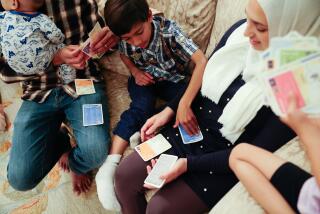Trying Time Again : Christmas can be difficult for children of separated or divorced parents. Key to coping is cooperation.
- Share via
Last May, when Theresa DePaolo and her husband broke the news to their 7- and 2-year-old daughters that the couple was separating, the oldest girl had two questions. “Is it my fault?” she first asked.
Her second question was: “What about Christmas?”
At that moment, DePaolo said, she was so overcome with sadness that she “could barely stand up straight,” much less fret about a holiday several months away. “But ever since then, I have been giving a lot of thought to it. Christmas is an incredibly important holiday for little kids. I will not let our personal problems and differences--which are very great--get in the way of parenting our kids.”
DePaolo plans to help her daughters make a gift for their dad, and she has invited him over to watch the kids open their presents. “The day is not complete if they don’t spend a part of it with him,” she said.
The holidays are stressful--and often depressing--for just about everyone, but the season is particularly trying for children of parents who are separated or divorced. Children are likely to feel the brunt of the pain, especially if they become enmeshed in their parents’ conflicts.
“The first holiday after a divorce or separation is the most difficult for children because it validates the reality that the divorce is real, and they will never live with Mom and Dad again,” said Rob Kaufman, an Encino licensed clinical social worker who leads divorce support groups. “To help their children deal with divorce, parents can put aside their hurt and anger toward their spouse. They can do their best to get along for the sake of the children.”
Keith Anderson of Agoura, for example, says he and his wife, Nancy--who have been separated for four years--attempt to “maintain a cooperative spirit” over the holidays. He keeps the longstanding family tradition of taking their two daughters, Genessa, 13, and Ashley, 16, to Disneyland on Christmas Eve, and the girls usually spend Christmas Day with their mother. Last year, the estranged couple even gave their daughters joint Christmas gifts. “Neither of us wants to short the other during this precious time of the year,” he said.
But the Andersons’ mutual cooperation is rare. “When people separate,” Kaufman said, “they do so because they can’t get along.” He added that divorced parents often use the holidays as ammunition in the battle against each other. A mother, for example, may tell her children, “I can’t buy you as many gifts as I’d like because your dad doesn’t give us enough money,” while the father may say, “I give all my money to your mother, so I can’t buy you Christmas presents.”
*
But such talk is painful for the child to hear. “It is harmful and uncomfortable to children when parents downgrade each other,” said Nancy Satenberg, a licensed clinical social worker and family mediator with the Los Angeles County court system. “It is important for parents to be sensitive to their child’s feelings about the other parent.”
Melody, for example, says she hates it when her mother and father “talk trash” about each other. “If one is mad at the other about something, I don’t want to know,” said the Santa Clarita teen-ager who asked that her real name not be used.
But even parents who try to minimize conflict can inadvertently make things tough on kids, Kaufman said. “If a child is supposed to spend Christmas with Dad, for example, Mom may say, ‘I know you have to go,’ but she will have tears in her eyes. . . . As hard as it is, the parent has to put a smile on his or her face and give the child permission to have a good time on the holiday with the other parent.”
Satenberg also cautions against allowing children to decide which parent to spend the holidays with. “It’s really important for parents to have a plan and tell children--even teen-agers--where they are going to be.” she said. “It is very difficult for children to choose one parent over another.”
The bottom line, said Satenberg, is that each parent should support and encourage the relationship the child has with the other. “That is the child’s parent for the rest of his or her life,” she said, “and part of the child is that other parent.”


